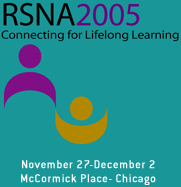
Abstract Archives of the RSNA, 2005
Gabriel Bartal MD, Presenter: Nothing to Disclose
Ehud Dafni PhD, Abstract Co-Author: Nothing to Disclose
Sharon Katz, Abstract Co-Author: Nothing to Disclose
Aviv Hirschenbein MD, Abstract Co-Author: Nothing to Disclose
The Last Image Hold (LIH) is an integral feature of any digital fluoroscopy system, but is limited to a single last image. Full dose radiography is utilized for the acquisition and storage of the representative images from dynamic events. Fluoroscopy is a dynamic modality and can be used for the acquisition of a dynamic event. Our aim was to evaluate a new feature of last fluoroscopy hold (LFH) in R&F system.
The LFH software feature was embedded into the SmartSpot PrimaX, R/F acquisition system (CMT Medical Technologies Ltd., Yokneam, Israel). Laboratory evaluation was performed at CMT clinical laboratory on antropomorphic tissue equivalent body phantom using synchronized mechanical tonometer simulating dynamic event. The LFH holds at a cyclic buffer memory last 250 images (30 seconds in 7.5 frames per second acquisition mode) during any fluoroscopy as a default instead of LIH. At the end of each fluoroscopy sequence the LFH is automatically displayed in cine mode and can be controlled by the operator in the R&F room including freeze, various frames/second sequences and selected image save. Two experienced certified radiologists (G.B. and A.H.) repeatedly (10 times each) recorded and displayed mid-position of the tonometer arm (set at 0.25 cycles per second) using LIH and LFH. LFH was displayed and evaluated in cine-loop mode.
In order to capture one mid-position of the tonometer arm an average of 4.5 acquisitions were required for LIH and only one acquisition for LFH. Average Fluoroscopy time was 13 seconds for LIH and 6 seconds for LFH per sequence. Average Fluoroscopy time and exposure for displaying the required tonometer arm position was significantly higher using LIH compared to LFH (9.75/1).
LFH is a reliable feature that significantly reduces fluoroscopy time and exposure, while increasing the number of documented diagnostic images which vanish with LIH. LFH also preserves and displays dynamic cine-loop features of fluoroscopy. Clinical evaluation is underway.
E.D.,S.K.,A.H.: Employee of CMT Medical
Bartal, G,
Dafni, E,
Katz, S,
Hirschenbein, A,
Would Dynamic Last Fluoroscopy Hold Replace Last Image Hold in Digital R&F Equipment?. Radiological Society of North America 2005 Scientific Assembly and Annual Meeting, November 27 - December 2, 2005 ,Chicago IL.
http://archive.rsna.org/2005/4420350.html

